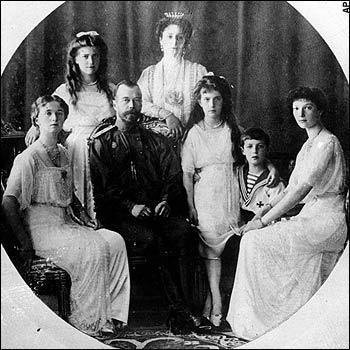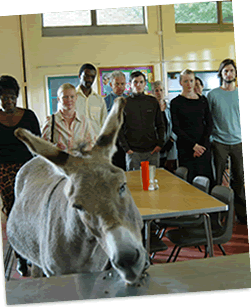Each week I sat in this shimmering space for my "Introduction to Philosophy" lecture. My lecturer was one of the best teachers I have ever had. Frustratingly I don't remember much about him, but I have vivid recollections of his teaching. Lectures would begin with him walking briskly to the lectern, removing his tweed cap and taking a piece of chalk from his pocket. The entire lecture would be structured as a conversation between "Chalky" and "Hatty". Hatty would pose a problem to which Chalky would respond - occasionally using one of the many blackboards to illustrate his point. I don't remember my teacher ever referring to notes nor do I remember him ever standing still; he paced constantly, eye's closed, holding in turn Chalky or Hatty as the dialogue progressed.
 |
| https://www.flickr.com/photos/oflinesandcolor /2241615711/in/set-72157594251486125 Some rights reserved |
Two particular lectures have stayed deeply rooted in my memory. The first was an introduction to Plato's Theory of Forms. Plato, in responding to the philosophic challenge of how we might know the universal essence of a thing, developed one of the most famous theories in philosophy. Let me try to illustrate the problem and Plato's solution.
Hatty: This morning I drank coffee from my coffee cup. As I drank, I wondered about how I know that a cup is a cup. I know my particular coffee cup is a cup because I have drunk from it before and I recognise it as the cup I drank from yesterday. But if today my housemate accidentally broke this particular cup and bought a new one to replace it and left it on the table for me, how would I know that the new cup was a cup and not, for example, a plate? No two cups are exactly alike and the new cup might be a little shorter or taller or fatter or thinner. It would likely have slightly different characteristics to any other cup I had ever known, but I would still know it to be a cup. How could this be?
Chalky: Well Socrates would tell you that in your head you have a perfect image of "cupness" and when you see the new cup, you compare it to this image and note that it fits the image more nearly than it does that of your image of "plateness" or any other category you hold in your head. Socrates called these categories "Forms" and argued that they are deeply grounded in our minds. They are part of an ideal world which includes also categories like "Good" and "Evil".
In a very simplistic nutshell, that is Plato's Theory of Forms. Hatty would no doubt have a lot of questions to ask about the idea as have philosophers since.
Assessment - from a Platonic perspective
The Theory of Forms has something in common with the challenge we as teachers have in assessing students' writing. Like the "cup" on the table, we must decide whether a student essay is a good approximation of "essayness" or not. But like the cup bought by Hatty's housemate, every student essay will have properties that are unique; there will be combinations of words I have never seen before. So how, when I look at an essay, can I decide if it is a good approximation of the ideal?A common answer teachers bring to this problem is the rubric. One view of a writing rubric is that it describes the characteristics of an ideal essay and acts as a template for judging individual student approximations of this ideal.
Immediately, of course, we hit a problem. Plato's forms exist only in the abstract (like the idea of a perfect circle) and a rubric that was even close to accurate would need to be so detailed as to be unworkable. Such a rubric might describe some of the elements of an ideal essay, but could never tell us how to combine these elements with originality or creativity and an essay without originality or creativity is surely not an ideal essay at all. In the end what rubrics for writing (such as those used for the GCSE) often end up saying is that an excellent essay demonstrates creativity and flare, which, as a detailed guide to teaching and assessment, isn't much use. In essence, all a rubric of this nature is telling a reader is that a good essay show's "good-essay-ness".
An alternative view
Fortunately Chalky and Hatty had more to say on the matter. Whilst the early lectures focussed on an introduction to Plato, some of the later ones address more modern responses to the same issues. A lecture about Wittgenstein's theory of Family Resemblances is vividly in my memory.Hatty: Understanding how two objects are related is difficult. One of the problems I am finding with Plato's Theory of Forms is that it seems to require that the ideal forms are present in my head from birth and that doesn't seem to correspond with my understanding of the world. I know that I can learn new things and whilst I can agree that there seem to be some categories that might be in my head from the beginning, that doesn't seem to be the case for many of the things I think I know. Maybe the concept of a circle was always in my mind, but I don't think the concept of a Canadian was. The category "Canadian" seems to be something I have learned and I can even imagine that, had history unfolded differently, this category might never have existed. Plato certainly would not have had an category of "Canadian".
Chalky: Indeed. The problem of how we can understand two related objects as being connected is very difficult. There is another way of understanding the problem developed by the 20th century philosopher Ludwig Wittgenstein.
 |
Imagine you have a family with 5 brothers.
Brother one has blue eyes, long hair, a long nose and big ears.
Brother two has blue eyes, long hair, a long nose but small ears.
Brother three has blue eyes, long hair but a short nose and small ears.
Brother four has blue eyes but short hair, a short nose and small ears.
Brother five has brown eyes, short hair, a short nose and small ears.
All five brothers belong to the same family but brothers one and five have no characteristics in common. What links them is not their individual characteristics but their relationship through shared characteristics with other members of the family.
Hatty: Interesting. But how does this help to solve the problems of essential understandings that we found existed in Plato's theory?
Chalky: Well what Wittgenstein is pointing out is that words and concepts don't have to have meaning in any essential way, but they can point to relationships or connections. What makes our 5 brothers members of the same family is not any particular quality they share, but the connections between them. If we think about the problem of recognising the cup that my housemate has bought, it is not any essential "cupness" that makes the new cup a cup, but some qualities which I recognise it as sharing with some other cups.
Although this may not sound very profound there is a very important difference in recognising the problem from this perspective of resemblances or, as Wittgenstein described them on other occasions, as language games. "Cupness" becomes not an essence but a set of shared characteristics which I recognise because I have been learning this "game". The rules of "cupness" can change as my culture changes its conventions on what will be seen as a cup. The rules of "Canadianess" are certainly changing constantly both at a formal legal level and also at the more subtle level of cultural identity.
Another metaphor that Wittgenstein used to explain the nature of concepts is that of a thread. In referring to the concept of "number" here's what he said:
Why do we call something a "number"? Well, perhaps because it has a direct relationship with several things that have hitherto been called number; and this can be said to give it an indirect relationship to other things we call the same name. And we extend our concept of number as in spinning a thread we twist fibre on fibre. And the strength of the thread does not reside in the fact that some one fibre runs through its whole length, but in the overlapping of many fibres. (source)
Hatty: So the insight we take from Wittgenstein is that words indicate relationships and we know concepts as being like a set of games, or connections or threads that we are constantly weaving and elaborating and extending.
Chalky: Exactly.
Some implications for assessment.
As we develop Standards and Benchmarks for our curriculum at UWCSEA and prepare them for use in our teaching and assessment, how should we understand their nature and purpose?
No doubt my thinking will evolve as the yarn spins, but, for the moment, here's what Chalky has lead me to think:
Rubrics are useful because they help to organise and prioritise the fibres that we will focus on in our teaching and students will use to make the threads of their learning. But the threads themselves are beyond the scope of a rubric, and, in the end, it is the threads that matter most, not the fibres.
To put this another way: our curriculum helps us to define specific parts of an essay that are useful to learn because this learning points to characteristics of language games which help students understand the cultural territory of "the essay". But a curriculum (or a rubric) can never provide the kind of complexity needed to understand how a specific essay fits within the category "essayness". This requires the enormous complexity of a well-trained, culturally complex, essay reader - a professional English teacher. The teacher who reads the essay and notices the original organisation of words can look to see how these words fit within the conventions of the game of "essayness" and make a decision about whether this particular essay is playing the game with flair or not.
This suggest two things to me about assessment in English:
1. The role and function of rubrics is limited. Powerful, yes, in focussing in on the crafted fibres of learning that expert teachers hone to point students towards the culturally vast and unstable spaces of understandings. But limited in that they are never an end in themselves.
2. Teachers need to trust their professional knowledge when they make judgements about attainment. In the end, it is the skill of the expert reader that we need to rely on when judgements are to be made about the way a particular essay has engaged in the playful cultural spaces of our language games.
Spinning a yarn
In Australia, my home, the process of storytelling is known vernacularly as "spinning a yarn". Bushmen sit drinking tea around campfires conjuring worlds from their words. For me, one of the great mysteries of the world is how this process works. How is it that a particular combination of words can come together in the hands of a gifted storyteller to build something strong and beautiful?
What Wittgenstein suggests is that spinning a yarn is not a skill we are born with but one we learn through our rich engagement in the complexity of our culture. I thank my wonderful lecturer and Chalky and Hatty for sharing this understanding.
At the most profound level, learning is a conversation; a thread we continue to spin.







